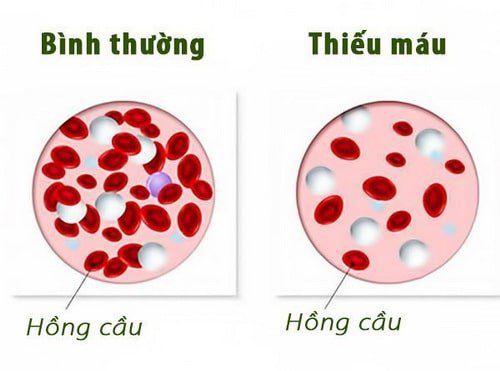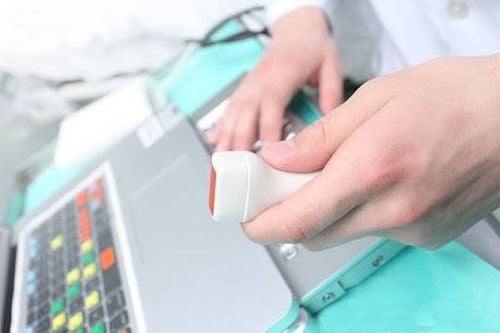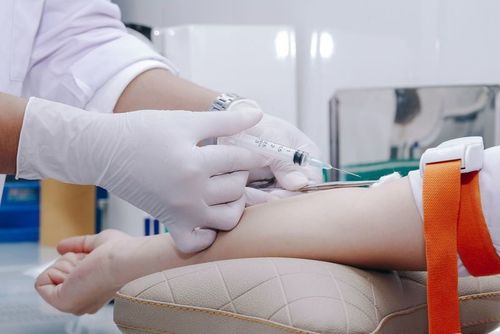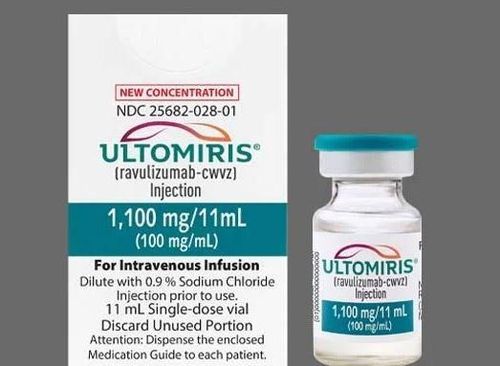This is an automatically translated article.
The article was consulted with Specialist Doctor I Nguyen Thi My Linh - Neonatologist - Department of Pediatrics - Neonatology - Vinmec Danang International General Hospital.Anemia is a condition in which the red blood cell count is below the normal limit, not only seen in adults but can sometimes occur in children. This condition makes your baby tired, cranky and weak. However, parents do not need to worry too much because cerebral ischemia can be detected and treated for children quite easily. The following article will help parents better understand cerebral ischemia in children and how to prevent cerebral ischemia in children.
1. What is cerebral ischemia in children?
Anemia is a condition in which the body does not have enough red blood cells or hemoglobin (hemoglobin) to carry oxygen to other cells in the body, including the brain. Hemoglobin is an iron-containing protein located in red blood cells. Hemoglobin is responsible for transporting oxygen to the tissues to nourish the body. The cells in the body need oxygen to survive.Therefore, young children can have cerebral ischemia due to the following reasons:
The baby's body does not produce enough red blood cells. Your baby's body has lost too many red blood cells, possibly from excessive bleeding The baby doesn't have enough hemoglobin in the red blood cells. Hemoglobin is a special pigment in the structure of red blood cells that is responsible for transporting oxygen to all cells in the body and helping to carry waste products (CO2). Children are diagnosed with anemia when the amount of hemoglobin in red blood cells is below the following limit:
Children from 6 months to 6 years old: Hemoglobin less than 110 g/l Children from 6 years old to 14 years old: Hemoglobin less than 120 g/l

2. Symptoms when children have cerebral ischemia
Pale, pale, or pale skin Eyelid contour and skin under the nails are less pink than usual Crying children Very weak health often tired Swollen hands and feet3. Is cerebral ischemia in children dangerous?
Anemia is a common disease in children, mainly due to the lack of iron in the diet, which provides enough iron for the child's development.Anemia affects most of the organs, so it affects the physical and mental development of children
The oxygen demand of the brain is very large, accounting for 20% of the whole body. When there is anemia, the blood is not enough to supply oxygen to the brain, which will damage the nervous system, causing the child to have:
Headache, dizziness, tinnitus, tinnitus May faint when suddenly changing position Reduce children's thinking and cognitive ability Poor concentration, forgetfulness, or drowsiness, affecting learning Anemia affects physical bodies such as:
Children are tired, lethargic due to lack of energy Children are less active than. Young children slow or stop gaining weight If anemia is severe enough, the child may become exhausted Poor breathing, or shallow, labored breathing Children with anemia are at greater risk of infections.

4. Treatment of anemia in children
It is necessary to clearly determine the cause of anemia in order to have a treatment method for the child. Therefore, parents need to take their children to the hospital for examination, diagnosis, and drug treatment.If the child has cerebral anemia due to an iron deficiency, he or she will be prescribed iron-containing medicine.
Currently, iron pills come in many forms, of which the most popular is a dropper for young children, and a liquid or tablet form for older children.
Your pediatrician will decide how long to give your child iron supplements by checking their blood levels regularly.
The mother must not arbitrarily stop the child from taking the drug without a doctor's prescription to ensure effective treatment.
5. Prevention of cerebral ischemia in children
Anemia is mainly caused by iron deficiency in the body, so parents can prevent their children from developing cerebral anemia by supplementing them with nutrients every day, ensuring that their children have a nutritious diet. by following these instructions:Do not give cow's milk until your baby is more than 12 months old. If your baby is breastfed, you should give your baby iron-fortified foods like cereal when starting to introduce solid foods.
If your baby is formula-fed, choose iron-fortified formula products.
Make sure older children have a balanced daily diet, supplemented with foods containing iron. Add iron-fortified nuts and cereals. Rich food sources of iron parents can give their children include: Egg yolks, red meat, potatoes, tomatoes, molasses and raisins, cooked potatoes with skins on. In addition, mothers should blend smoothies, let children eat the whole intestine in juice. Cerebral ischemia affects the physical and mental development of children, so parents need to pay attention to the child's manifestations to detect promptly if the child has cerebral ischemia. Supplementing iron through daily nutrition with treatment as directed by the doctor, the child's anemia will be improved quickly, making the card healthier and smarter.
Iron deficiency anemia can cause dangerous complications for children's health and mental health, so parents need to observe and timely supplement this important source of vitamin.
In addition to dietary supplements, parents can give their children supportive foods containing iron and essential micro-minerals such as zinc, lysine, chromium, selenium, vitamin B... to help meet their full needs. meet the nutritional needs of children. At the same time, these essential vitamins also support digestion, enhance nutrient absorption, help improve anorexia, and help children eat well.
>> Parents can learn more: What disease can iron deficiency cause? The article was professionally consulted by Dr. Phan Dinh Thuy Tien - General Internal Medicine - Department of Medical Examination & Internal Medicine - Vinmec Nha Trang International General Hospital.
Please regularly visit Vinmec.com website and update useful information to take care of your baby and family.
Please dial HOTLINE for more information or register for an appointment HERE. Download MyVinmec app to make appointments faster and to manage your bookings easily.
Reference source: Thaythuocvietnam.vn














